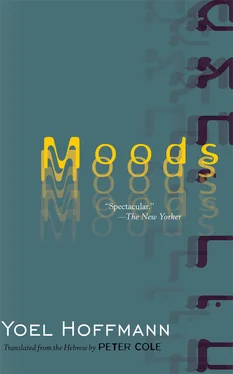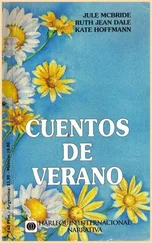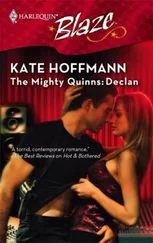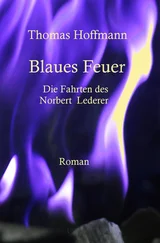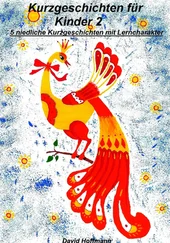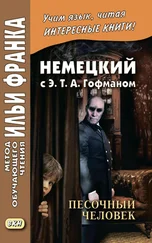We’ve always wanted to know a man named Osip. We wanted to say Good morning, Osip — or Osip, what’s up.
The name is suddenly cut off, but even afterward it sails on like a huge boat toward a place that had been prearranged.
It’s unfortunate when a woman is named Griselda. On the whole, women should walk around without names.
We see them here and we see them there carrying a tragic basket or trying on a dress, and we can’t forget for a moment how they’re split within and become someone else.
In their childhood, which resembles a hoopoe bird (in gym shorts), and in their dotage as well (in shoes fitted to their feet in special stores), they are extremely beautiful.
[54]
This book is a book of moods. We could call it The Book of Moods.
Now we’re filled with love, and now it’s hatred. Sometimes we hate things we’ve loved or love things we’ve hated, and there is no end to it.
Once we hated spiders, and today we love them. Especially those with thin legs and round bodies. Because we don’t drive them away (as others do), they spin webs in all sorts of places and come and go across the floor and along the walls, and sometimes they hang all night long over the bed, a pinky’s length from our heads.
And when we sit at the table, intending to write, along comes a spider across the paper and it stands there over the words.
[55]
It’s possible to leave the earth and watch it grow smaller and smaller. Till now we’ve seen this only in a dream.
Maybe the dead see such a sight. Or saints. In the commentary by Onkelos to the biblical passage about Abishag the Shunammite, it says that she lay beside the old king and sank into her thoughts. First (so it says) she drew the bedding out of herself. Then the king. Then the palace, and finally she hovered in a kind of spiritual space (as Onkelos puts it) in which there remained not a trace of anything material.
Most likely the elderly king looked at her and thought that his time too had come to pass away from this world and on to others, but memories seized him like crabs taking hold of a dead fish.
[56]
Now we’re thinking about the woman psychoanalyst.
From the diploma on the wall we learned that she had made her way to people in the know in Switzerland. In our mind’s eye we saw how she traveled there with her two breasts hidden within her suit jacket like stowaways.
Something about her recalls Glenn Gould. That chilly thing that makes us think of the hospital morgue in Cincinnati.
Picture an Orthodox Jew who has been exiled to the Canary Islands. He can’t find a prayer shawl or phylacteries. There isn’t any kosher food. He’s looking for a synagogue. He wants to pray and chant his hymns, to whisper anguished petitions, but the people around him are selling watches.
[57]
A cow can hear the voice of the calf that’s hers, even when hundreds of calves are mooing. She responds to his moo and he responds to hers.
Sometimes the movement of the heavenly bodies in their circuits is disturbed, and, for instance, the moon disappears, and then the cows lift their eyes to the sky and moo.
A question of considerable import is: Do weeds and trees experience longing? Once we saw an insurance agent weeping. He said something about a policy and suddenly burst into tears, and out of embarrassment we asked him only if he’d like some coffee.
He drank his coffee and wiped away the tears (people kept handkerchiefs in jacket pockets then) and stuffed the hanky into a pocket in his pants.
[58]
We also remember how the chorus teacher wept. He wept because the children threw chalk at one another and sent paper airplanes through the air and didn’t listen when he shouted “Quiet!”
When a person who doesn’t speak Hebrew hears the word bakhah (wept) he can’t guess what it means. He might think that bakhah is a kind of tree used to build boats or a cookie (which is to say, a small flat cake).
Especially strange is that system of inflections by which we conjugate words like bakhiti (I wept), bakhita (you wept), bakhah (he wept), bakhinu (we wept), etcetera.
[59]
After her husband the Italian died, Mrs. Shtiasny lost her mind. She called Aunt Edith and my stepmother Francesca names like krumme Ziege (crooked goat) and ein weiblicher Schnurrbart (woman’s mustache).
Once she woke Mr. Cohen, who was already a hundred and one, at midnight and asked him if it was A.M. now.
Within that madness she also understood things. She pointed to the corner of the room and said, “I’m not there,” or she took the pictures off the wall in the hall while saying things like, “This is not a sun,” or “These aren’t horses.”
[60]
In the end, Mrs. Shtiasny stopped speaking and only every once in a while would say, “ Die Unterwelt ” (that is, the Underworld).
(It’s hard to say that Charles Darwin explained the world. The changing seasons. Day and night. The light that falls on an eel. The ends of words. A corridor.)
On a clear winter’s day Mrs. Shtiasny sat in the yard. All the others went to eat and came back to their rooms for a nap. At three o’clock the hair on her head was lit by sunlight (the upper world) and burned with the colors of fire until dusk fell.
[61]
It’s hard to believe that all this is taking place within a book. The people must be very small. Or maybe the power of imagination is employing signs (from among some twenty-plus) and turning them, by means of a kind of sorcery, into all these different things?
We’ve heard that people masturbate in front of the word ishah (woman). It’s hard to see how the letters arouse them. Maybe the last one.
In the twelfth century a Chinese court calligrapher hanged himself from the palace rafters because he couldn’t draw the character for man without thinking about what makes one.
It’s highly probable that Jewish scribes copying sacred Jewish texts descend into the darkest of moods whenever they scribble a letter in error while writing a writ of divorce.
Once upon a time we knew a man whose name was Horovitz, and he’d always say, “Just one v .”
[62]
When one goes astray, one really goes there. That is, one goes there as one goes home, and finds that being there has a shape and borders, and that people want to know what it’s like between them. Being astray isn’t easy, as the air is thin and the sky very high and the ground beneath one comes and goes.
Children also find their way there, but usually start crying until someone retrieves them. The elderly, on the other hand, don’t look back. They don’t remember other states. Some have even forgotten their names. But in the end they manage to find the toy elephant or the wooden train that once upon a time they’d misplaced.
[63]
Sometimes we start weeping for no reason at all, or for one we can barely recall.
Ezra Danischevsky’s mother we saw just a single time. We were having soup she’d made and went out (Ezra and I) to play in the yard. Nonetheless, when we heard (thirty years later) that she’d died, tears welled up in us, even though we remembered only the paff paff sound that her slippers made.
Once we rushed a sick dog to the veterinarian’s apartment. His name was Dr. Gottlieb and his apartment was on Clement Street. Because the door to his building was locked, we became extremely agitated and went around to the back of the building, where we saw a light and shouted the name of the street loudly.
[64]
We’d go down into the world of the dead if only we could meet William Saroyan. He would understand such things.
In a certain respect we too are like Armenians exiled to California. Things like the names of department stores make us wonder.
Читать дальше
